HIV stands for human immunodeficiency virus. It attacks a person’s immune system. It can be transmitted through blood, sexual fluids, and from mother to child via breast milk. While there is currently no effective cure, it can be prevented as well as controlled with proper care.
STD or STI, stands for sexually transmitted disease/sexually transmitted infection. They can be transmitted through sexual fluids, skin-to-skin contact, or mother to child, depending on the specific infection. STDs/STIs are preventable and many are treatable.
In this section, you can find FAQs and links to more information.
STD
- Doxycycline Post-Exposure Prophylaxis (doxy-PEP) for the Prevention of Bacterial Sexually Transmitted Infections (STIs)
- Recommendations for Providing Quality Sexually Transmitted Diseases Clinical Services, 2020
- California STI Treatment Guidelines Table for Adults & Adolescents
- California Sexually Transmitted Infections (STI) Screening Recommendations
- California Sexually Transmitted Infections (STI)/HIV Screening Recommendations in Pregnancy
- CA Department of Public Health (CDPH) - Congenital Syphilis
- STD Data
- Teen Source/HOOKUP
- Family Pact
- Centers for Disease Control and Prevention Sexually Transmitted Diseases
- STD Learning Center
- STD Treatment Guidelines from the CEC
STD Facts Sheets
- Bacterial Vaginosis
- Chlamydia
- Gonorrhea
- Hepatitis (viral)
- Herpes (Genital)
- HIV/AIDS
- Human Papillomavirus (HPV)
- Molluscum Contagiosum
- Pelvic Inflammatory Disease (PID)
- Syphilis
- Trichomoniasis
HIV Facts Sheets
- About HIV | HIV | CDC
- Living with HIV | HIV | CDC
- Stigma and HIV | HIV | CDC
- Preventing HIV | HIV | CDC
- HIV & Women
- Riverside County HIV Data
Local Agencies
- Inland Empire HIV Planning Council (IEHPC)
- Desert Aids Project
- AIDS Assistance Program
- Planned Parenthood
- San Bernardino HIV/AIDS Program
- Aids Project Los Angeles (APLA)
- Family Services of the Desert
National/California Agencies
- Riverside County Crisis line - Call 24-hours a day, seven days at week at (951) 686-HELP
- National Suicide Hotline - Call 1-800-273-TALK (8255)
- Living with the Stigma
- A Positive Life
- Project Inform Perspective
- CDC Guidance for Prevention and Treatment of MPX in Persons with HIV Infection

STD FAQs
Sexually transmitted diseases (STDs), also known as sexually transmitted infections or STIs, are very common. Millions of new infections occur every year in the United States.
STDs are passed from one person to another through sexual activity including vaginal, oral, and anal sex. They can also be passed from one person to another through intimate physical contact, such as heavy petting, though this is not very common.
STDs do not always cause symptoms or may only cause mild symptoms, so it is possible to have an infection and not know it. That is why it is important to get tested if you are having sex. If you are diagnosed with an STD, know that all can be treated with medicine and some can be cured entirely.
STDs are preventable. If you have sex, know how to protect yourself and your sexual partner from STDs. Some of the most common STDs are Bacterial Vaginosis, Chlamydia, Gonorrhea, Hepatitis, Herpes, HIV, Human Papillomavirus (HPV) Infection, and Syphilis.
STDs can make you unable to have children, cause birth defects or diseases in babies. Some STDs are painful. Most STD's, syphilis, gonorrhea, or Chlamydia can be cured if treated right away. Others, like HIV, HPV or herpes, cannot be cured.
Most of the time, you can't tell if someone has an STD by looking at them. A person can look healthy and still have an STD. And you can't always tell by asking them – a person can have an STD and not know it!
Use a condom every time you have sex. Latex or polyurethane (plastic) condoms are best. Now there are condoms for women to use too. Condoms for men fit over the man's penis. Condoms for women are inserted vaginally. You can buy condoms in a grocery store or drugstore.
Birth control methods, other than condoms, will not protect you from STD's. Use a condom (for men or women) along with your birth control method.
It is safest to have sex with only one person who only has sex with you. If either of you have sex with other people, you can get STDs. The more people that you or your partner have sex with, the more likely that you will get an STD.
There are ways to be close without sharing body fluids (semen, vaginal fluids or blood). Hugging and touching are safer than sex because no fluids are shared.
If you or your partner has sores or bumps around the vagina, penis or mouth, don't have sex or touch the sores. Get a check-up and wait until the clinic says it is safe.
Don't mix sex with alcohol or other drugs. This can lead you to take risks that you might not take if you were not under the influence.
Don't have sex when it isn't right for you. It's your body and your choice whether or not to have sex. Decide ahead of time what is right for you.
Get treated. Finish taking all of your medicine. Don't stop even if you feel better.
Ask your partner(s) to get checked. Although it can be hard to say something, they need to know so they can get tested. The nurse can give you a partner notification letter.
Don't have sex until you and your partner are cured or your clinic tells you it is safe.
Use a condom and spermicide when you have sex.
Learn more about STDs. Talk to your doctor or clinic nurse.
Talking to your partner about using condoms may not be easy for you. Think about what you want to say ahead of time. You may even want to practice with a friend.
"I'd really like to have sex with you as long as we use condoms. Using condoms protects both of us."
"You know, it makes sex even better for me knowing that both of us are protected. Let's use condoms"
"Did you see that TV show about HIV last night? It seems like everyone needs to use condoms these days."
Many STDs have no symptoms. If symptoms appear, women may see unusual vaginal discharge, sores, bumps, burning when urinating, and redness or itching around the vaginal area. Typical symptoms for men may include discharge from the penis, burning when urinating, and sores, bumps, or redness on or around the penis.
PrEP (pre-exposure prophylaxis) is medicine people at risk for HIV take to prevent getting HIV from sex or injection drug use. When taken as prescribed, PrEP is highly effective for preventing HIV. For more information, click here.
PrEP may be right for you if you test negative for HIV, and any of the following apply to you:
- have a sexual partner with HIV
- have not consistently used a condom, or
- have been diagnosed with an STD in the past 6 months.
- inject drugs and have an injection partner with HIV, or share needles, syringes, or other equipment to inject drugs (for example, cookers).
PEP (post-exposure prophylaxis) is medication taken to prevent HIV after a possible exposure. PEP should be used only in emergency situations and must be started within 72 hours after recent possible exposure to HIV. For more information, click here.

